MercoPress. South Atlantic News Agency
Mercosur
-
Thursday, August 4th 2016 - 21:52 UTC
Venezuela defies Mercosur members and announces it will “fully exercise the presidency”
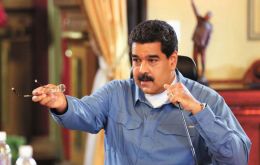
Venezuela has defiantly confirmed that is will fully exercise the “self-proclaimed” presidency of Mercosur, despite the opposition from Argentina, Brazil and Paraguay, who consider the chair vacant and are meeting in Montevideo to find an alternative for the six month mandate.
-
Wednesday, August 3rd 2016 - 06:10 UTC
Argentina, Brazil and Paraguay consider Mercosur chair 'vacant' and call for urgent meeting
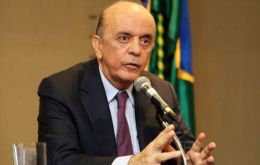
Mercosur's disarray and fault lines were again exposed when Brazil, Argentina and Paraguay insisted that Venezuela's self proclamation as president of the group was invalid, and also expressed disappointment with Uruguay for having ended its mandate last Saturday causing “great uncertainty”.
-
Wednesday, August 3rd 2016 - 06:02 UTC
Venezuela rejects call for Mercosur meeting and claims a conspiracy against Bolivarianism
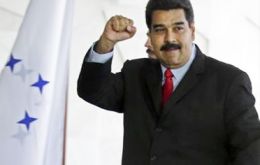
Venezuela rejected Argentina's call for an urgent Mercosur meeting and underlined it is exercising the group's pro tempore presidency “legally” accusing Brazil, Argentina and Paraguay of being part of a Triple Alliance which is re-editing “a sort of Plan Condor against Venezuela to harass and criminalize its model of development and democracy”.
-
Tuesday, August 2nd 2016 - 06:52 UTC
Mercosur in a state of disarray; Venezuela's presidency disavowed by Argentina, Brazil and Paraguay

Argentina, Brazil and Paraguay have announced they do not support Venezuela as the pro tempore presidency of Mercosur, further deepening controversy in the group which could even hinder ongoing trade negotiations with the European Union and closer links with the Pacific Alliance.
-
Monday, August 1st 2016 - 13:09 UTC
Venezuela announces it now holds the chair of Mercosur; strong objections from Paraguay (and Brazil)

Venezuela announced to fellow Mercosur members that for the rest of the year it was the new chair of the group, following on the expiration of Uruguay's six month mandate on Saturday, 30 July. The news was released by Spain's official news agency EFE, which alleges to have had access to the letter sent by the Venezuelan foreign ministry to the other four members.
-
Saturday, July 30th 2016 - 06:30 UTC
Mercosur: Brazil and Paraguay's rejection of Venezuela is “a desperate attitude”

Brazil and Paraguay's rejection to Venezuela holding the Mercosur rotating chair sounds much like a “desperate” attitude, but nevertheless it is unpostponable, said Venezuela foreign minister Delcy Rodríguez: ”it is impossible that the compliance of the (Mercosur) treaty can't be respected”.
-
Saturday, July 30th 2016 - 05:39 UTC
Mercosur limbo: Uruguay's presidency is over, who will hold the rotating chair ?

Uruguay made public on Friday a letter sent to Mercosur fellow full members stating the finalization, this Saturday 30 July, of its six-month presidency of the group, which means the rotating chair “should be transferred to Venezuela”. The letter was accompanied by a 32 page report of its six-month as chair of the group, particularly intense because of the trade negotiations with the European Union.
-
Saturday, July 30th 2016 - 04:22 UTC
Mercosur controversy: Brazil does not oppose Venezuela, but Caracas must first comply with agreed set of rules

Brazilian interim president Michel Temer laid out the steps Venezuela must comply with before it is confirmed as full member of Mercosur, and following on that can effectively become chair of the group. Temer's Friday statement makes clear Brazil's position in the ongoing controversy regarding Venezuela's aspiration to succeed Uruguay in the rotating chair.
-
Thursday, July 28th 2016 - 11:23 UTC
Uruguay will transfer Mercosur chair to Venezuela, despite objections from Brazil and Paraguay
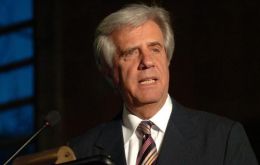
Despite objections from Brazil and Paraguay, Uruguay next Saturday 30 July will transfer to Venezuela the rotating chair of Mercosur for the second half of the year, as indicated in the “group's rules and regulations”.
-
Monday, July 25th 2016 - 11:20 UTC
Paraguay and Brazil reiterate “Venezuela is a non full member of Mercosur”
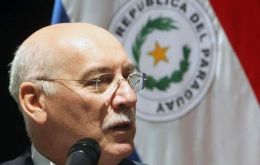
Paraguay announced officially that it will not be attending the Common Market Council of Mercosur in Montevideo next 30 July, if the agenda includes the transfer of the group's presidency to Venezuela.
